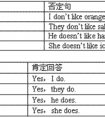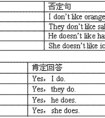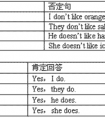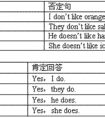Therearetreesthehouse.[ ]A.some, inB.a, inC.some, infrontof-五年级英语
题文
| There are trees the house. |
|
[ ] |
| A. some, in B. a, in C. some, in front of |
答案
| C |
据专家权威分析,试题“Therearetreesthehouse.[ ]A.some, inB.a, inC.some, infron..”主要考查你对 不定代词,介词短语 等考点的理解。关于这些考点的“档案”如下:
不定代词介词短语
考点名称:不定代词
- 不定代词:
不指名代替任何特定名词或形容词的代词,来表示不确定的人、事物或数量。
主要有:all,each,every,both,either,neither,one,none,little,few,many,much,other,another, some,any,no 一般不定代词用法举例:
1.some 一些,某些,某个
不定代词some可以代替名词和形容词,常用在肯定句中作主语、宾语、定语等。作定语时,它可以修饰可数名词(单、复数皆可)和不可数名词。例如:
some are doctors,some are nurses.有些人是医生,有些人是护士。(作主语)
2.any一些,任何
不定代词any可以代替名词和形容词,常用在否定句或疑问句中作主语、宾语、定语等。作定语时,它可以修饰可数名词(多为复数)和不可数名词。例如:
there isn’t any ink in my pen.我的钢笔没有墨水。(作定语)
不定代词any有时也可以用在肯定句中,表示"任何的"。例如:
you may come at any time;i’ll be home the whole day.你任何时候来都行,我整天都将呆在家里 。
不定代词any也可以用作副词,做状语,表示程度。例如:
is he any better today?他今天好一点了吗?
3.all 全体,所有(指三者以上)
不定代词all在句中可以作主语、宾语、表语、定语或同位语。
它可以代表或修饰可数名词和不可数名词。
代表或修饰可数名词时,指两个以上的人或物。
作先行词时,引导词用that。例如:
all were present at the meeting.全都到会了。(作主语,代表可数名词)
4.both 全部,都
不定代词both指两个人或事物。和all一样,可以用作主语、宾语、定语或同位语。例如:
we invited both to come to our farm.我们邀请两个人都来我们的农场?(作宾语)
5.none 无人或无
不定代词none的含义和all物相反,和no one,not any同义,但其用法相当于名词,在句子中一般作主语或宾语。
它代替不可数名词作主语时,谓语动词用单数形式;代替可数名词作主语时,谓语动词用单、复数皆可。例如:
none of the problems is /are easy to solve.这些问题没有一个是容易解决的。(作主语, 代替可数名词)
6.either 两者之中的任何一个,这个或那个。
不定代词 either 可以作主语、宾语和定语。例如:
either of them will agree to this arrangent.他们两人中会有人同意这样的安排的。(作主语)
7.neither 两者都不
不定代词 neither 是 either 的否定形式,可以作主语、宾语和定语。例如:
neither is interesting.两个都没有趣。(作主语)
8.each 每个,各自的
不定代词each指每一个人或事物的个别情况,甚至指这些个别情况各不相同。
它在句中可以作主语、宾语、定语和同位语。例如:
she gave the children two apples each.她给了每个小孩两个苹果。(作the children的同位语。)
9.every 每个,每一的,一切的
不定代词every有"全体"的意思,和all的意义相近,但只能作定语。- some和any的用法比较:
some和any均可代替名词和形容词,作定语时,它所修饰的名词既可以是可数名词,也可以是不可数名词。
some一般用于肯定句或肯定形式的答语中,any一般用于否定句或疑问句中否定形式的答语中。
例:There are some birds in the tree. 树上有一些鸟。
There is some bread in the dish. 盘子里有一些面包。
— Do you have any story-books? 你有故事书吗?
— Yes, I have some. 是的,我有。
— No, I don’t have any. 不,我没有。
no 用在肯定句中表示否定的意思。
例:There are no letters for you today. 今天没有你的信。
考点名称:介词短语
- 介词:
是一种用来表示词与词,词与句之间的关系的词。在句中不能单独作句子成分。介词后面一般有名词代词或相当于名词的其他词类,短语或从句作它的宾语。
介词和它的宾语构成介词短语,在句中作状语,表语,补语,定语或介词宾语。
例: infrontof在……前面 infrontof意思是“在……前面”,指甲物在乙物之前,两者互不包括;
其反义词是behind(在……的后面)。
例:Therearesomeflowersinfrontofthehouse. 房子前面有些花卉。 - 常见类型:
1、介词+名词形式:
of course当然,自然,无疑 ;in detail详细地 ;on duty值班,上班
2、动词+名词形式:
take care小心,当心 ;tak ecare of照顾,照料 ;take place发生,进行
3、动词+介词形式:
ask for请求,要求 ;arrive at达成,得出 ; call for邀请,要求,需求
4、动词+副词形式:
come up走近,上来,发生,被提出 ; get in进入,收获,收集 - 小学常见介词短语:
1. wait for
等候 Wait for me. I want to go shopping with you.
2. help ---with---
帮------干------ I can help my mom with some housework.
3. at home
在家 He was not at home yesterday.
4. hold on
保持,别挂机 Hold on, please. He’s writing an e-mail in the study..
5. on foot
步行 I go to school on foot.
6. get to
到达 I usually get to school at 8:00 am.
7. get on
上车 Get on the No. 28 bus when it stops.
8. get off
下车 Get off at the third station.
9. turn on
打开 It’s dark in the room. Please turn on the light.
10.turn off
关闭 We should turn off the light before we leave.
11. on holiday
度假 My family are going to Canada on holiday.
12. play with
(与)------玩 I can play with the snow in winter.
13. a glass of
一杯 There is a glass of water on the desk.
14. put on
穿上 It’s cold today. Put on your sweater please.
15. take off
脱下 It’s hot now. Take off your coat.
16. put away
放好 Put away your books. We are going to have a P.E class.
17. look for
寻找 I am looking for my dog.
18. on time
准时 I get to school on time every day.
19. in time
及时 The man fell down. The doctors came in time.
20. go on a trip
- 最新内容
- 相关内容
- 网友推荐
- 图文推荐
| [家长教育] 孩子为什么会和父母感情疏离? (2019-07-14) |
| [教师分享] 给远方姐姐的一封信 (2018-11-07) |
| [教师分享] 伸缩门 (2018-11-07) |
| [教师分享] 回家乡 (2018-11-07) |
| [教师分享] 是风味也是人间 (2018-11-07) |
| [教师分享] 一句格言的启示 (2018-11-07) |
| [教师分享] 无规矩不成方圆 (2018-11-07) |
| [教师分享] 第十届全国教育名家论坛有感(二) (2018-11-07) |
| [教师分享] 贪玩的小狗 (2018-11-07) |
| [教师分享] 未命名文章 (2018-11-07) |






